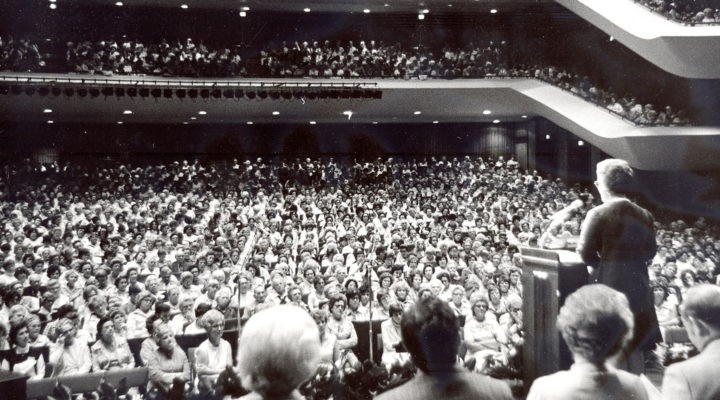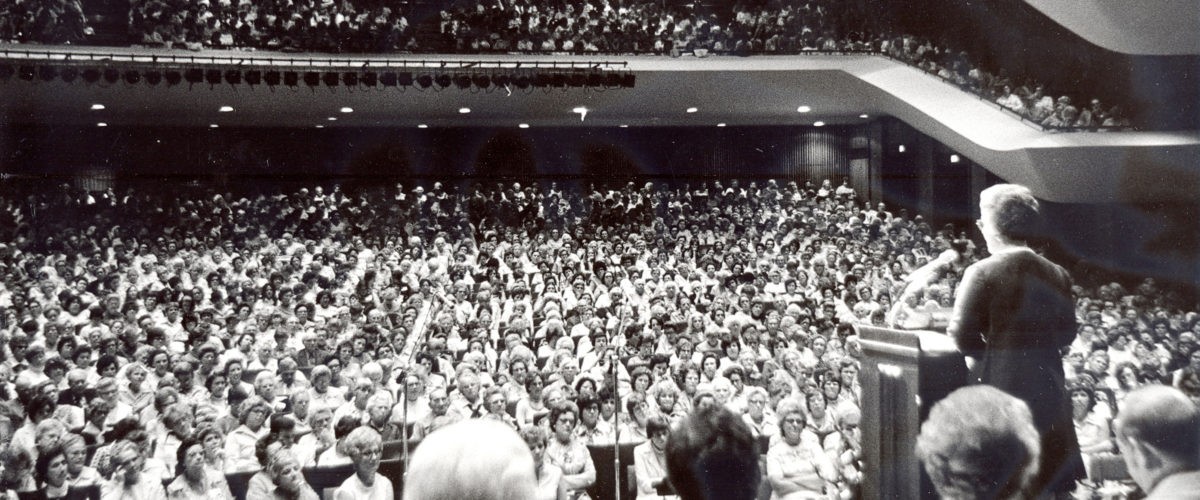Meredith Stone is the new executive director of Baptist Women in Ministry, coming to the role from a faculty position at Logsdon Seminary at Hardin-Simmons University in Abilene, Texas. She succeeds Pam Durso, who has gone on to become president of Central Baptist Theological Seminary, where she succeeded Molly Marshall, who remains perhaps the best-known advocate for women in ministry in Baptist life and one of the founders of the organization.
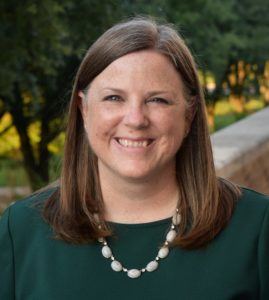
Meredith Stone
From its beginnings, BWIM has bridged the span between the local church and higher education, and so the selection of a seminary professor and administrator to lead the organization follows in that tradition. Stone also has served on the governing board of BWIM over the past decade, bringing a wealth of institutional knowledge to her role.
BWIM traces its roots to the mid-1970s, although a formal organization didn’t emerge until the 1980s — set against the battle for control of the Southern Baptist Convention. Research done by BWIM through the years continues to demonstrate that even when congregations say they believe God calls women to vocational ministry, they often are slow to make that call a reality among their own staff.
Baptist News Global spoke with Stone about her perspectives on where BWIM has come from, the state of the world today and what’s next.
I remember as a young journalist covering those early meetings of Southern Baptist Women in Ministry, which seemed like such a revolutionary thing at the time — especially playing out against the fundamentalist takeover of the SBC. How are things different today than they were in those early days of Baptist women gathering to celebrate God’s call to women as ministers?
Although I wasn’t around in the early days, the theme of that time seemed to be apologetic. Women had to defend themselves, their callings and their right to speak and even be present. While in some circles the need for that defense continues, in many others the argument has been accepted, and now the next phase of the work comes in advocating for how we move from acceptance to application and integration. It’s one thing for a congregation to affirm that women can be ministers, but still another huge step for them to call women ministers and create an environment in which they can fully utilize their gifts and leadership.
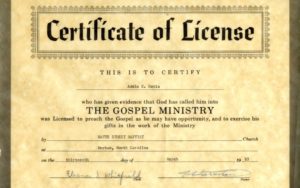
On Aug. 9, 1964, Addie Davis became the first ordained woman minister in Southern Baptist circles. On that Sunday, Watts Street Baptist Church in Durham, N.C., set her apart for the gospel ministry.
In those early days, it was so hard for women to be heard and even harder to be taken seriously as pastors and preachers. The pioneers of this movement seemingly had to shout just to be heard above the din of “tradition.” How have Baptist women called by God into vocational ministry been able to modulate their witness with changing times?
Centuries of patriarchy within the church takes an abundance of time and effort to dismantle, so shouting was certainly warranted then … and still now. Sometimes the voiceless don’t need a voice to speak on their behalf so they can be heard, they just need someone with access to a megaphone to share. And in the early days, megaphones were needed in massive supply to get people’s attention. But over the past nearly 40 years as our voices have been heard and we have seen change affected within many places of Baptist life, it has opened up the opportunity for us to employ different forms of communication and advocacy that can push the movement forward in new ways and hopefully reach into places that need a different approach. But we’ll still keep a few megaphones on hand for a little while longer too.
Reading BWIM’s history, a note that jumps out from the early days was criticism on one hand that the organization was “too liberal” and from the other hand that it was “too conservative.” No doubt that same tension remains today, and here you are an ordained woman from conservative West Texas. How do you balance this too-liberal or too-conservative critique in the present time?
Any work on justice issues is always viewed as both too-liberal and too-conservative at the same time. I feel as though my time in West Texas has taught me this lesson well. My personal philosophy has been to seek to meet people where they are, and then to invite them to take the next step. What that next step is in each unique place looks too liberal to some, and too conservative to others. But it is my hope that with every step taken, the church as a whole will move closer to being a reflection of God’s justice and love in this world.
BWIM’s own research has shown over and over that there remains a gap between churches that say they support women in ministry and churches that actually will call a woman as senior pastor. How do you explain this behavior, and what is the remedy?
For every congregation that would fit into this category the answer is probably different. Some congregations who support women in ministry don’t call a woman to a senior pastor role because their membership/budget is declining, and it feels too risky to make a big change. Others don’t call women because they don’t understand how to read women’s resumes alongside the resumes of men who have had very few obstacles in obtaining opportunities for service and leadership. Still others don’t call women because they haven’t created a culture of equality within all aspects of their congregation, and so equality in senior leadership is unimaginable.
“Sometimes the remedy is simply making sure there is someone on the pastor search committee who is persuasive and willing to take a risk that puts feet to their convictions.”
While the explanations could go on, potential remedies include providing training for committees on how to consider women candidates and resumes, equipping churches to engender equality in all areas of their ministry, and helping all churches in decline find the support systems they need as they navigate a different era of church. And, frankly, sometimes the remedy is simply making sure there is someone on the pastor search committee who is persuasive and willing to take a risk that puts feet to their convictions.
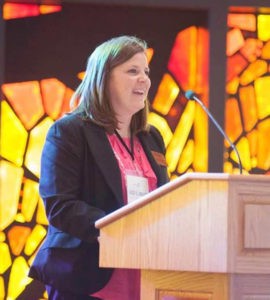
Meredith Stone in the Logsdon Seminary chapel.
What can we Baptists learn from the more widely accepted integration of women into pastoral roles in the Methodist, Presbyterian, Lutheran and Episcopal churches?
The differences between Baptists and these mainline denominations is primarily (1) they are years ahead of us on women in ministry; and (2) they have more bureaucratic methods of appointing and/or placing pastors instead of congregational polity and search committees. It is an odd thing that Baptist churches elect a committee comprised of people who have never done the job of a pastor and likely do not really understand what the job of pastor entails beyond Sundays to hire a person to perform the duties of a pastor. So one thing Baptist search committees can learn from these denominational groups, then, would be to ask for help in conducting their search, enlist a consultant, visit with representatives from your denominational group, or maybe even Baptist Women in Ministry. Committees can solicit advice and still maintain the congregational polity that is a hallmark of Baptists.
As someone who has been directly involved in the education of young ministers for some time now, what should we understand about the abilities and attitudes of women coming through seminaries today?
The women students I have taught in seminary are just as called, gifted and talented as the male students. Some of them had confidence in their calling when they arrived at seminary, while others needed their years of seminary to find their voice. Like men, recent seminary graduates still need the opportunity to make mistakes as they learn.
“Too often women who are hired out of seminary are expected to be perfect in ways that men are not.”
Too often women who are hired out of seminary are expected to be perfect in ways that men are not. When a young male minister fails to make a hospital visit or attend a committee meeting, people will say, “He’s young. He’ll learn.” But when a young woman minister makes the same mistake, it is blamed on her gender. Churches that are willing to call women coming through our Baptist seminaries, and who then offer those women the affirmation, grace and training that those women need, will be blessed beyond measure as they find able, willing and gifted ministers to lead them.
What are your hopes or aspirations for BWIM in the coming years?
I truly believe we are on the cusp of a huge increase in Baptist churches’ support of women in all leadership roles. As more and more churches see examples of women serving and thriving, it will inspire and give them the courage to empower women as well. My hope for Baptist Women in Ministry is that we can continue to be the catalyst that drives that move in our Baptist world.
But my hopes are not only for more women to be called, but also for more women to thrive. Traditional support systems for ministers are mostly patriarchal in nature, and so my hope is that Baptist Women in Ministry will continue to provide and grow new programs that support and nurture women as they minister and lead.
What role could allies play — women who may not be called to vocational ministry themselves as well as men who are both clergy and laity — in advancing the cause of women in ministry today?
First, find ways to support the callings of every woman in your church. If she is called to be a pastor, a university president, a fifth-grade teacher, a home-schooling mom or social justice protester, validate her calling and support her dreams of living into it. Transform every space in your church into a space of equality for women. Teach Sunday school lessons about women in the Bible. Empower women to serve on the finance committee and the hospitality committee. Put women in the pulpit and hand them megaphones. Rising tides raise all ships.
Second, send a word of encouragement to and say a prayer for any women in ministry you know. Their world is probably more difficult than you can imagine. They could use a friend, a listening ear and kind words.
Third, nominate yourself for the personnel and search committees at your church.
Related articles:
Meredith Stone to lead Baptist Women in Ministry
Study says stained-glass ceiling slowly lifting in churches
3 faulty assumptions that keep Baptist churches from hiring female pastors
Women cannot serve as pastors. Really, Southern Baptists, you’re going to go there again?

